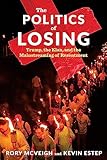The Politics of Losing : Trump, the Klan, and the Mainstreaming of Resentment / Rory McVeigh, Kevin Estep.
Material type: TextPublisher: New York, NY : Columbia University Press, [2019]Copyright date: ©2019Description: 1 online resourceContent type:
TextPublisher: New York, NY : Columbia University Press, [2019]Copyright date: ©2019Description: 1 online resourceContent type: - 9780231190060
- 9780231548700
- 320.56/909 23
- E184.A1
- E184.A1
- online - DeGruyter
- Issued also in print.
| Item type | Current library | Call number | URL | Status | Notes | Barcode | |
|---|---|---|---|---|---|---|---|
 eBook
eBook
|
Biblioteca "Angelicum" Pont. Univ. S.Tommaso d'Aquino Nuvola online | online - DeGruyter (Browse shelf(Opens below)) | Online access | Not for loan (Accesso limitato) | Accesso per gli utenti autorizzati / Access for authorized users | (dgr)9780231548700 |
Frontmatter -- CONTENTS -- 1. Introduction -- 2. The Ku Klux Klan in American History -- 3. Power and Political Alignments -- 4. Economics and White Nationalism -- 5. Where Trump Found His Base -- 6. Politics and White Nationalism -- 7. Status and White Nationalism -- 8. White Nationalism Versus the Press -- 9. The Future of White Nationalism and American Politics -- Conclusion: Making America White Again -- Appendix: Methods of Statistical Analysis -- Acknowledgments -- Notes -- Index
restricted access online access with authorization star
http://purl.org/coar/access_right/c_16ec
The Ku Klux Klan has peaked three times in American history: after the Civil War, around the 1960s Civil Rights Movement, and in the 1920s, when the Klan spread farthest and fastest. Recruiting millions of members even in non-Southern states, the Klan's nationalist insurgency burst into mainstream politics. Almost one hundred years later, the pent-up anger of white Americans left behind by a changing economy has once again directed itself at immigrants and cultural outsiders and roiled a presidential election.In The Politics of Losing, Rory McVeigh and Kevin Estep trace the parallels between the 1920s Klan and today's right-wing backlash, identifying the conditions that allow white nationalism to emerge from the shadows. White middle-class Protestant Americans in the 1920s found themselves stranded by an economy that was increasingly industrialized and fueled by immigrant labor. Mirroring the Klan's earlier tactics, Donald Trump delivered a message that mingled economic populism with deep cultural resentments. McVeigh and Estep present a sociological analysis of the Klan's outbreaks that goes beyond Trump the individual to show how his rise to power was made possible by a convergence of circumstances. White Americans' experience of declining privilege and perceptions of lost power can trigger a political backlash that overtly asserts white-nationalist goals. The Politics of Losing offers a rigorous and lucid explanation for a recurrent phenomenon in American history, with important lessons about the origins of our alarming political climate.
Issued also in print.
Mode of access: Internet via World Wide Web.
In English.
Description based on online resource; title from PDF title page (publisher's Web site, viewed 02. Mrz 2022)


